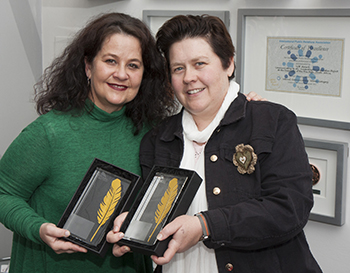UFS Communication and Brand Management wins for the third time in the 2017 International Gold Quill Awards

Lacea Loader, Director: Communication and Brand
Management and Leonie Bolleurs, Assistant Director:
Internal Communication in the same department.
The awards were presented at the Excellence
Awards Gala in Washington, D.C. on
Tuesday 13 June 2017.
Foto: Hannes Pieterse
The Department of Communication and Brand Management at the University of the Free State (UFS) has won two International Gold Quill Awards from the International Association of Business Communicators (IABC) for projects executed in 2016. “Winning two Gold Quill Awards put the entrant in the top ranks of the business communicators of the world,” said Ghrethna Kruger, IABC 2017 Quill Awards Chair South Africa.
The Department won Gold Quill Merit Awards for their entries of the publication, For such a time as this: A commemorative journey, and the communication process with prospective students through the Sound[W]right: UFS student tone and voice project.
Two Gold Quill Awards in 2017
This is the third time the department has received recognition by the IABC. In 2014, it received the Jake Wittmer Research Award, a Gold Quill Merit Award, and an Africa Gold Quill Award. In 2015 the department received an Africa Merit Award, Africa Gold Quill Merit Award, a Gold Quill Merit Award, and a Gold Quill Excellence Award. “I am very proud of the nine awards we have won over the past couple of years. Being recognised by a prestigious global association such as the IABC is a great honour. The fact that the UFS is the only tertiary education institution in the country to receive awards this year makes it even more special," said Lacea Loader, Director: Communication and Brand Management at the UFS.
With the 2017 IABC Awards the IABC has in total recognised 227 entries as world class, announcing 74 Excellence Awards and 153 Merit Awards. They represent a cross-section of public- and private-sector organisations, both large and small. This year there were 13 winners from South Africa compared to last year’s three winners.
Work reflects superior production values
Entries were evaluated against the IABC Gold Quill Awards criteria and IABC’s seven-point scale of excellence. Feedback from the IABC Gold Quill evaluators, on the publication, For such a time as this: A commemorative journey stated: “Exceptional effort and an excellent gift that celebrates your honoree and preserves school history. It demonstrates superior production values and strong images convey key messages.”
On the entry: Sound[W]right: UFS student tone and voice project, the IABC Gold Quill evaluators said: “This entry shows innovation, collaboration, persistence, generosity and strategic intent. They have accomplished much within a very limited budget, to the benefit of both the university and its students.”
“The Gold Quill Awards programme celebrates business communication’s best practices and the value professional, strategic communication programmes bring to an organisation’s bottom line, its brand and its reputation,” said Lynn Barter, ABC, MC, chair of the IABC awards committee. “Each entry is evaluated on its own merits against IABC’s Global Standard of excellence in communication. Winning a Gold Quill recognises exceptional work, innovation and creativity.
Taking communication to the next level
“Gold Quill winners represent a global community executing their responsibilities ethically and to the highest standards of the profession. These exemplary practitioners deliver high impact results for their organisations and clients, taking communication to the next level.”